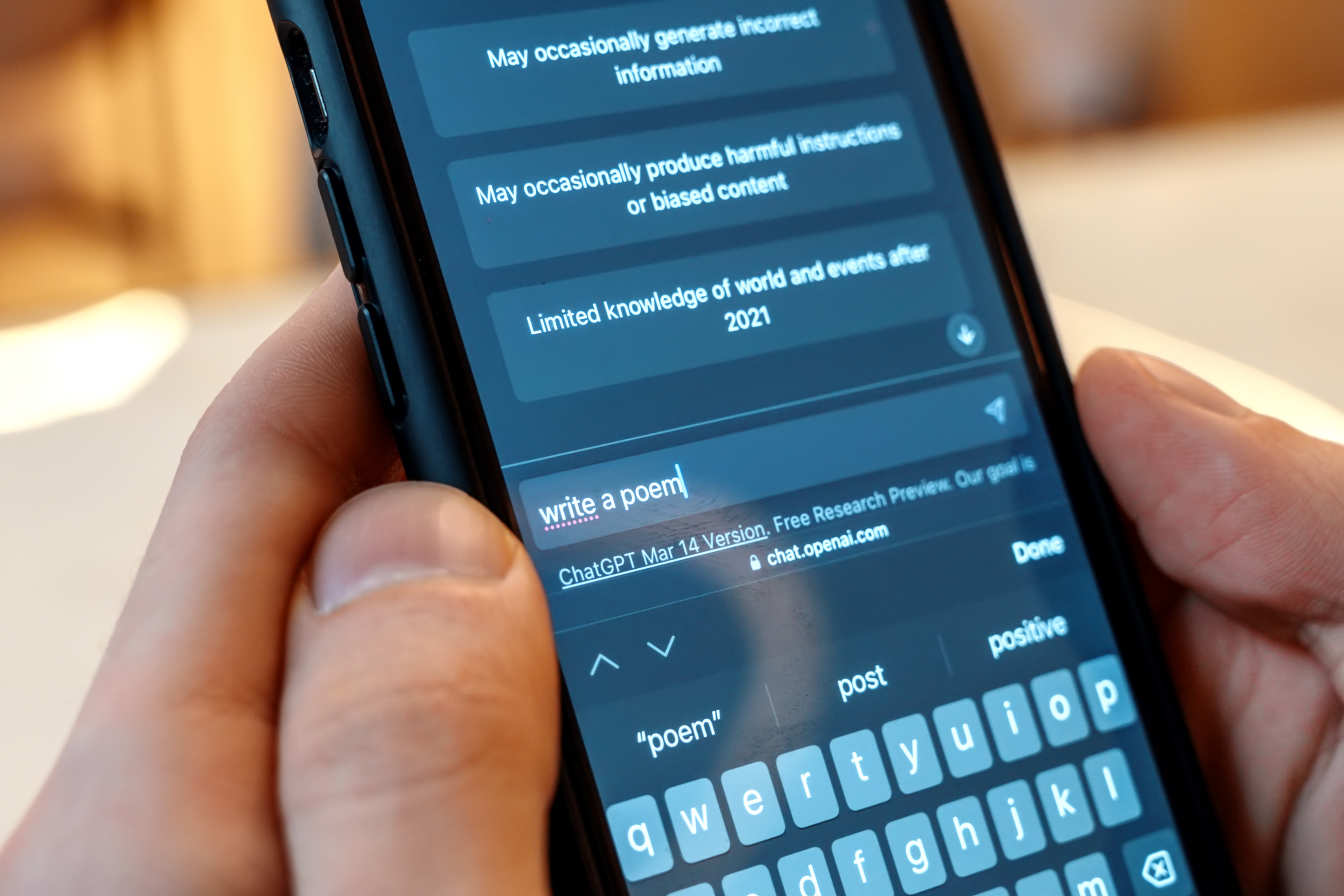
ChatGPT has emerged as a revolutionary tool in AI and machine learning, aiding users from various fields, including marketing, content creation, and personal tasks. Understanding how to write ChatGPT prompts to get the best results is crucial for effectively leveraging this powerful language model.
This blog is your survival guide. We'll crack the code of prompt engineering and show you how to craft queries that generate mind-blowing results, whether you're a marketing whiz, a content king, or a regular person tired of writer's block. Get ready to unlock the full potential of AI writing—your creative revolution starts now!
ChatGPT Prompts 101
A ChatGPT prompt is the input given to the AI model. It’s the starting point of any request or conversation. The quality of the prompt directly influences the response you get. Whether generating ideas for a blog post, creating social media posts, or even developing email marketing strategies, the prompt you write sets the direction for ChatGPT’s output.
Why Create a Perfect ChatGPT Prompt?
The better the prompt, the better the response. Engineers trained ChatGPT from vast amounts of text data.
This training gave it access to information and showed how humans respond in conversations. From all its “reading,” ChatGPT developed a language model to predict the next word in a given sentence.
Crafting the perfect prompt is akin to providing clear instructions to a skilled assistant. It ensures that the responses are relevant and tailored to your needs, whether content marketing, generating data-driven marketing strategies, or providing customer service.
How to Write Effective ChatGPT Prompts

Writing effective ChatGPT prompts is a skill that can significantly enhance the quality and relevance of the responses you receive from the AI model. Whether you’re a content marketer, a product manager, a student, or simply someone curious about AI, knowing how to communicate with ChatGPT effectively can be immensely beneficial.
Here’s a guide to help you craft prompts that lead to more accurate and valuable outputs.
Understand the AI’s Capabilities and Limitations
Recognize ChatGPT’s Strengths: ChatGPT excels in language processing, text generation, and providing information on various topics. Use this to your advantage by asking for content creation, data summarization, or educational explanations.
Acknowledge Limitations: ChatGPT may not have access to real-time data, and its knowledge is limited to what it has been trained on. It’s not suitable for providing personal advice or opinions.
Crafting the Prompt
Be Clear and Concise: Ambiguity can lead to responses that don’t meet your expectations. Clearly state what you’re looking for. If you need a blog post about ‘SEO strategies,’ specify that rather than just saying, ‘Write about marketing.’
Provide Sufficient Context: Context is crucial for a relevant response. If you’re asking for a response in a specific tone, mention it. For example, “Write a humorous summary of the history of SEO” gives ChatGPT a clear direction.
Specify the Desired Format: If the format is essential (like a list, a detailed explanation, or a brief overview), mention this in your prompt. For example, “List five key benefits of AI in marketing.”
Use Direct Language: Avoid overly complex or verbose language in your prompts. Simple, direct language is more effective in communicating your request.
Set Boundaries and Constraints: If there are specific things you want to avoid or include, mention them. For example, if you ask for product ideas, you might specify a particular industry or customer base.
Advanced Prompting Techniques
Sequential Prompts: Consider breaking them down into a series of prompts for complex tasks. Start with a general question and then narrow it down based on the responses you receive.
Leverage Creative Scenarios: Don’t hesitate to use hypotheticals or creative scenarios if they can aid in getting your point across. For instance, asking ChatGPT to role-play a situation can yield exciting insights.
Iterative Refinement: Don’t expect perfection in the first go. Refine your prompts based on the responses you get. It’s often a process of trial and error.
Prompt for Multiple Perspectives: If you want comprehensive topic coverage, ask ChatGPT to provide different viewpoints. For example, “Explain the benefits and drawbacks of using AI in content marketing.”
Testing and Learning
Experiment with Variations: Try different phrasings or angles on the same topic to see which yields the best response. It can be particularly useful for content creators and marketers.
Learn from Responses: Pay attention to how ChatGPT responds to different prompts. Over time, you’ll understand what works best for your specific needs.
Keep Up with Updates: As AI technology evolves, so do the capabilities of tools like ChatGPT. Stay informed about updates and new features that can enhance your prompting strategy.
Remember, writing effective ChatGPT prompts is as much an art as a science. It requires understanding the tool, being clear and specific in your requests, and sometimes a bit of creativity and experimentation.
You can craft prompts that consistently yield valuable and relevant responses with practice.
Types of ChatGPT Prompts

ChatGPT prompts can be categorized into various types, each serving a different purpose and requiring a slightly different approach to crafting them. Understanding these types can help you better utilize ChatGPT for your needs, whether for personal use, education, content creation, or business applications.
Here are some of the primary types of ChatGPT prompts:
Informational Prompts
A type of ChatGPT prompt specifically designed to elicit factual, informative responses. When you use an informational prompt, you ask ChatGPT to provide data, explanations, or detailed information on a specific topic.
These prompts are typically straightforward and focus on a subject’s who, what, when, where, why, or how.
Purpose: To gather facts, explanations, or detailed information about a topic.
Example: “Explain the concept of blockchain technology.”
Creative Writing Prompts
Creative writing prompts are stimuli or guiding instructions that inspire imaginative and creative writing. These prompts can take various forms, such as a sentence starter, a scenario, a question, or even a single word or phrase.
Their primary purpose is to spark ideas and encourage writers to explore new themes, characters, stories, or writing styles. They are widely used in educational settings and by individuals seeking to enhance their creative writing skills.
Purpose: To generate creative content like stories, poems, or dialogues.
Example: “Write a short story about a time-travelling detective.”
Instructional or Tutorial Prompts
A type of request made to ChatGPT to obtain step-by-step instructions or guidance on how to perform a specific task or activity. These prompts elicit detailed, often sequential, information that helps the user understand how to complete a process or learn about a particular subject.
This prompt type helps learn new skills, understand complex procedures, or get practical advice on various topics.
Purpose: To get step-by-step instructions or tutorials on a specific task.
Example: “How do I bake a chocolate cake?”
Idea Generation Prompts
A type of ChatGPT prompt specifically designed to stimulate creativity and brainstorming. When you use these prompts, you ask ChatGPT to generate various ideas, concepts, or suggestions based on a topic or theme.
It can be beneficial for tasks like coming up with new topics for blog posts, creative story ideas, innovative solutions to problems, or even generating unique marketing strategies.
Purpose: To brainstorm ideas, such as for projects, blog topics, or problem-solving.
Example: “Generate five unique blog post ideas about renewable energy.”
Conversational Prompts
Conversational prompts are input designed to engage ChatGPT in a dialogue, simulating a natural conversation. These prompts are crafted to initiate, continue, or steer a conversation in a particular direction.
Unlike informational or instructional prompts that seek specific facts or steps, conversational prompts are more about interaction and exchanging ideas or responses.
Purpose: To engage in a dialogue, either for entertainment, practice, or to simulate a conversation.
Example: “Role-play a job interview for a software engineer position.”
Analytical or Critical Thinking Prompts
A type of ChatGPT prompt is designed to engage the AI in a deeper, more thoughtful topic analysis. These prompts require AI to evaluate, reason, or provide insights beyond factual reporting.
They often involve open-ended questions or scenarios that stimulate critical thinking and analysis.
Purpose: To analyze a situation, provide opinions, or think critically about a topic.
Example: “Evaluate the impact of social media on teenage mental health.”
Personalization and Recommendation Prompts
A type of prompt designed to obtain tailored suggestions or recommendations based on provided criteria or preferences. When you use these prompts, you ask ChatGPT to consider specific interests, needs, or conditions to generate a customized response.
Purpose: To receive personalized suggestions or recommendations.
Example: “Suggest a list of books for someone interested in learning about astrophysics.”
Problem-Solving Prompts
A type of input or question designed to engage the AI in finding solutions or suggesting strategies for specific challenges or issues. These prompts are formulated to present a particular problem or situation, aiming to leverage ChatGPT’s vast knowledge base and analytical capabilities to generate practical, creative, or insightful solutions.
Purpose: To find solutions to specific problems or challenges.
Example: “How can a small business increase its online presence on a limited budget?”
Feedback and Review Prompts
In the context of ChatGPT, there are requests for the AI to evaluate, critique, or provide opinions on a specific piece of work, idea, or concept. These prompts are designed to solicit constructive feedback, insights, or reviews.
The aim is to gain an external perspective, often to refine or enhance the quality of the work in question. When using these prompts, providing the content you want feedback on and specifying any particular focus areas or concerns is essential.
Purpose: To get an evaluation or feedback on a particular work or idea.
Example: “Provide feedback on this short story plot outline.”
Data Processing and Summarization Prompts
Refer to a request made to ChatGPT that involves analyzing and condensing information from a given data set. The purpose of these prompts is to transform complex, lengthy, or detailed data into a more understandable and concise format.
For instance, you might provide ChatGPT with a large dataset, a lengthy article, or a detailed report and ask it to extract the key points, summarize the main findings, or present the data in a simplified manner. This type of prompt is beneficial for quickly grasping the essence of complex material without going through all the details.
Purpose: To process given data and summarize or extract useful information.
Example: “Summarize the key findings of this research paper on climate change.”
Understanding these types can enhance your ability to use ChatGPT effectively. It helps in asking the right questions correctly, leading to more accurate, relevant, and valuable responses from the AI model.
Prompt-Writing Tips
Writing effective prompts for ChatGPT is crucial to get the best results. Here are ten prompt-writing tips to help you communicate your requests clearly and achieve more accurate and relevant responses:
Balance Detail with Brevity: While details are essential, overly long prompts can be confusing. Aim for concise but comprehensive prompts.
Ask Open-Ended Questions: Encourage detailed responses by asking open-ended questions that require more than a simple yes or no answer.
Practice Regularly: Like any skill, prompt writing improves with practice. Experiment with different types of prompts and learn from the AI's responses.
Stay Informed: Keep up with updates and improvements in AI technology. New features and capabilities may enhance your prompt-writing strategy.
Include Relevant Keywords: If there are specific keywords or terms you want the AI to include in its response, mention them in your prompt.
Avoid Negative Language: Minimize using negative or confusing terms in your prompts. Clear and positive language leads to better outcomes.
Be Patient: Allow the AI some time to generate a response. Complex queries may require a bit more time for the AI to process.
By following these tips, you can enhance your prompt-writing skills and improve the responses you get from ChatGPT.
All Things Considered
Mastering the art of writing effective ChatGPT prompts can significantly increase brand awareness, aid in content creation, and streamline various AI-assisted tasks. Whether you’re a prompt engineer, a business professional, or just an AI enthusiast, the ability to craft the right prompt is an invaluable skill in the age of artificial intelligence.
With practice and adherence to these strategies, you can write prompts that yield the best results for your needs. Explore the World of ChatGPT Prompts with Prompt Engineering Daily!
Stay informed with the latest AI news by Subscribing Today!
FAQs
Does ChatGPT give the same answer to everyone?
ChatGPT does not necessarily give the same answers to everyone. The responses generated by ChatGPT are influenced by several factors, including the specific wording of the query, the context provided, and even the evolving nature of the AI model itself.
How does ChatGPT handle sensitive or controversial topics?
When addressing sensitive or controversial questions, ChatGPT responds neutrally and factually, drawing on its training data. It operates without personal biases or agendas and is designed not to offer misleading or harmful information.
Can I ask ChatGPT to perform complex tasks, like coding or data analysis?
Yes, you can use ChatGPT to analyze data. You must be a premium ChatGPT plus user to access the latest ChatGPT beta feature—Advanced Data Analysis. ChatGPT can also analyze data with the help of plugins for data analysis.